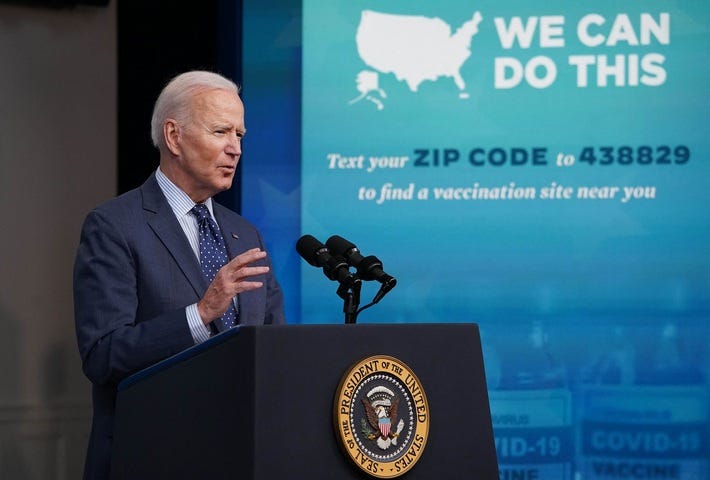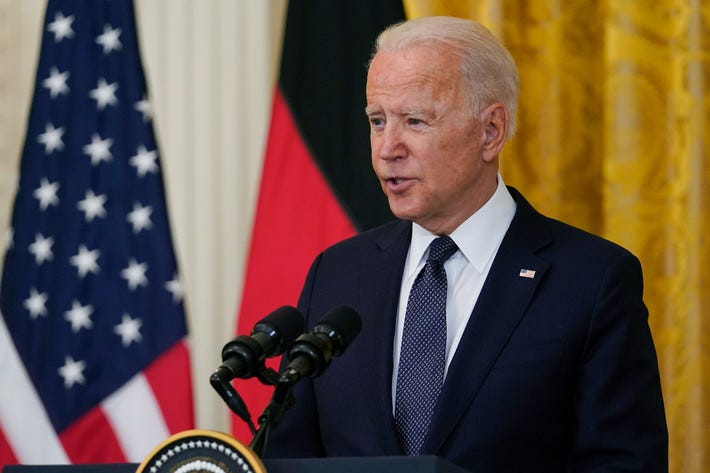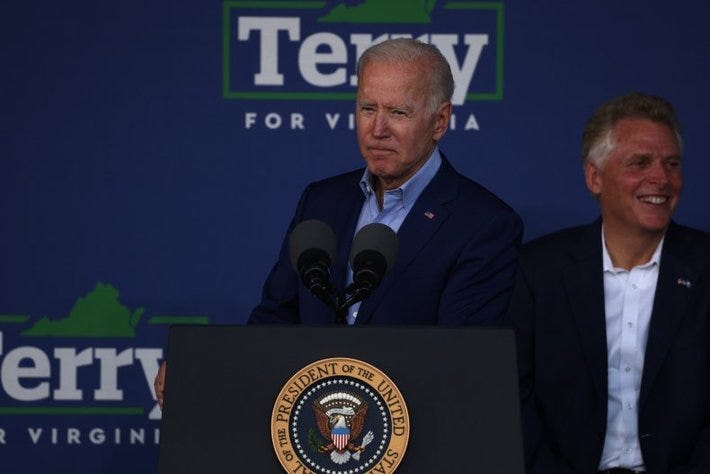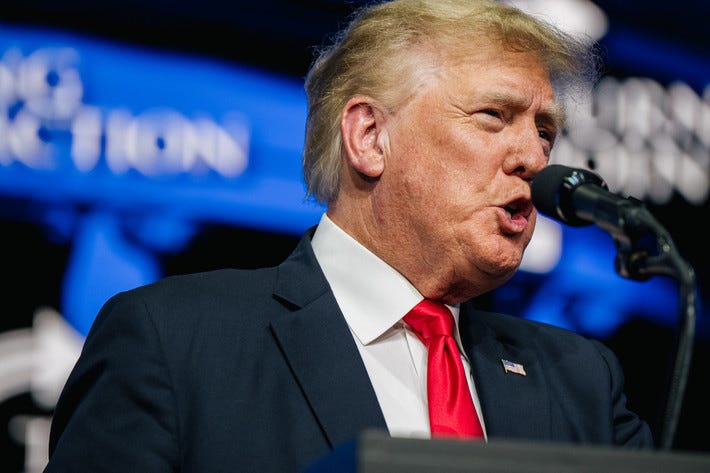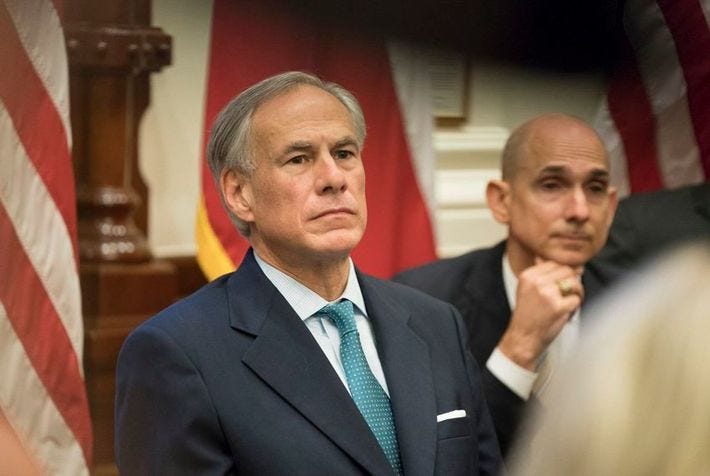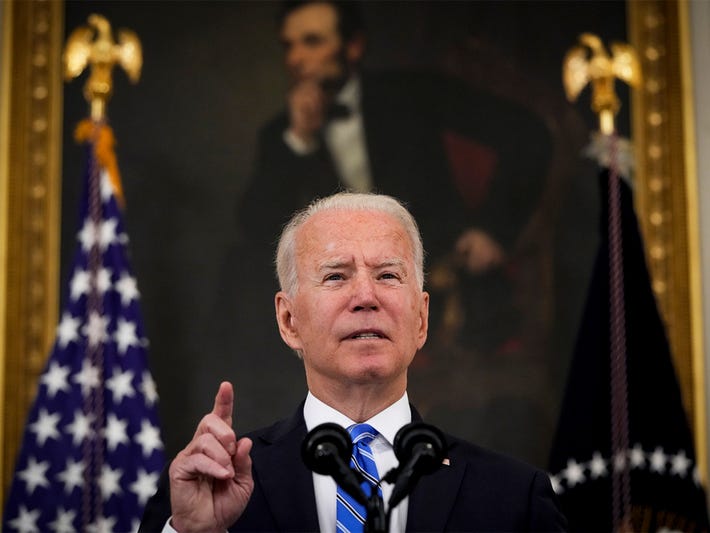President Joe Biden's presidency is now six months old. You'd be forgiven if you didn't realize how long Biden has been in office because Biden doesn't generate anywhere near the same news interest (see Google searches) as his predecessor, former President Donald Trump, did.
The lack of a topsy turvy first few months has translated to Biden's approval rating. It's been the most stable for any president since the end of World War II.
This, indeed, has been the story of the Biden presidency from a popularity standpoint. At every point at which I've checked in to see how Biden is doing from a historical perspective, nothing seems to shake his approval ratings.
Right now, Biden's average approval rating rests at around 53%, no matter how you calculate said average. Over the course of Biden's first six months in office, his approval rating has never risen above 55% or fallen below 51% in an average of polls. It was 53% in April and 54% in May.
To give you an idea of what a narrow lane Biden's approval rating is in, you only need to look at history.Prior to Biden, the average range for post-World War II presidents in their first six months in office was 14 points. Biden's range is less than a third of that.
Joe Biden's approval rating simply hasn't moved in six months
Nearly every other president saw his maximum and minimum approval rating differ by about greater than 7 points or more. (Lyndon Johnson's gap was about 5.5 points.)
Former President Donald Trump's range was 10 points, and he was thought to have an approval rating that was historically stable.
Biden, though, hasn't really picked up any new supporters since the election. His approval rating matches his vote share (51%) and favorable rating in the exit polls (52%) nearly perfectly.
On the other hand, it's been noticeable how Biden's relative ranking on approval rating has risen the more time has gone on. Biden's initial approval rating was near the bottom (only beating Trump) back in January.
Today, it beats Trump, Gerald Ford and Bill Clinton's. Barack Obama and George W. Bush's approval ratings are within the margin of error of Biden's approval rating.
With increased polarization, Biden's approval rating probably has a better chance of not significantly moving during his presidency than it may have in an earlier era.
On the polarization front, Biden has to be pleased that Democrats still seem to stand firmly behind him. It's hard to find any reputable poll where his approval rating among Democrats is below 90%. In the latest ABC News/Washington Post poll, for instance, it's 94%.
No other president in the post-World War II era had an approval rating at this point within his own party as Biden has now.
That's not to say it's all groovy for Biden.
The percentage of people firmly behind Biden seems to have shifted down a little bit. In the AP-NORC poll, for example, 25% and 26% of the public strongly approved of him in their last polls. In every poll of theirs before the most recent, more than 30% of the public strongly approved of Biden.
Likewise, in an average of live interview polls, the percentage of the public who strongly approved of Biden went from 31% in both January and February to 27% now.
A big question going forward is whether this signals that Biden's base may not be as strong as it appears at first glance.
Another bad piece of news for Biden is that the opposition to him seems to have hardened. Biden's disapproval rating is now in the low to mid-40s than the mid-30s it was back in January. This reflects more people going from undecided to disapproving of Biden.
If Biden was hoping that his efforts in the first six months of his presidency would bring over new supporters, he is mistaken -- at least for the moment.
Of course, Biden would probably accept not gaining any supporters, as long as he doesn't lose any. His approval rating is still above water, and that's certainly better than his predecessor.
President Joe Biden’s approval rating dips to 50%, lowest since he took office
President Joe Biden’s approval rating has dipped six percentage points to 50%, his lowest mark since taking office in January, according to the latest Gallup poll.
Biden’s reduced rating comes as the highly contagious COVID-19 Delta variant spreads and increases cases among unvaccinated Americans, and amid continued polarization, according to Gallup. For the first time, support for Biden among independents dipped below a majority to 48%, and Democratic support at 90% marks a new low as well. Biden’s overall performance during his term’s first second quarter — an average of 53% — is still better than former Presidents Donald Trump and Bill Clinton during the same time period, with Gallup noting economic gains including lower unemployment and an infrastructure deal pushing through the Senate on Biden’s watch.
Forty-five percent disapprove of the Democrat’s performance and 5% told Gallup they had no opinion. Only 12% of Republicans support Biden’s work thus far, the poll showed. But Biden still enjoys more support from independents than Trump ever received in Gallup’s poll.
Gallup reported that the roughly three-percentage-point dip in Biden’s average approval rating over the first and second quarters is on par with dips seen for Trump and former President George W. Bush.
Historically, Gallup shows third-quarter ratings dropping even further; even former President Barack Obama, who enjoyed a 62% approval rating at this point, saw a 10-point drop after unemployment paired with legislative battles over the Affordable Care Act.
Gallup surveyed more than 1,000 adults across the country between July 6-21. The margin of error is plus-or-minus four percentage points, Gallup said.
Dr. Anthony Fauci, the nation’s top infectious disease expert, said Sunday that the U.S. is “going in the wrong direction”when it comes to COVID-19. The nation’s daily death toll may increase beyond 850 — which is more than triple the current average — unless more people get vaccinated, “particularly when you have a variant like Delta, which has this extraordinary characteristic of being able to spread very efficiently and very easily from person-to-person,” Fauci warned.
Joe Biden's Pandemic Approval Rating Falls Amid Lockdown, Delta Variant Fears
President Joe Biden's pandemic approval rating has plummeted to its lowest level, according to a new poll, possibly fueled by a fear that lockdowns could return amid a surge in coronavirus cases due to the highly transmissible Delta variant.
Just over six in 10 (63 percent) of Americans approve of the president's handling of the pandemic, the ABC News/Ipsos poll found. The number is a nine-point drop from Biden's highest result (72 percent) in the same survey in late March.
According to the poll, a majority of Americans (62 percent) are concerned that they or someone they know will be infected with the coronavirus, with 20 percent reporting they were "very concerned." Thirteen percent said they were "not concerned at all."
The poll, which surveyed 527 adults between July 23 and 24, also found that about three-quarters (74 percent) say they have had at least one dose of a coronavirus vaccine. The latest data from the U.S. Centers for Disease Control and Prevention (CDC) shows that 68.8 percent of adults in the U.S. have received at least one dose of a coronavirus vaccine.
But asked about whether they feel optimistic or pessimistic about the coming year, 55 percent said they were pessimistic about the way things are going in the country. Only 45 percent said they were optimistic.
Americans were far more optimistic about the same question when asked in early May. That poll found 64 percent were optimistic looking ahead to the next 12 months, while just 36 percent were pessimistic.
Meanwhile, concerns about contracting coronavirus is higher (67 percent) among those who are at least partly vaccinated than those who are not (47 percent).
Trump Claims Americans Not Taking COVID Vaccine Because They 'Don't Trust the President'
Former President Donald Trump told a rally of his supporters on Saturday night that Americans are refusing to take the COVID-19 vaccine because they "don't trust" President Joe Biden.
Speaking during a rally in Phoenix, Trump touted the success of his administration's Operation Warp Speed vaccine rollout, and claimed that many Americans now do not trust Biden enough to be inoculated.
"How about the vaccine? I came up with the vaccine. They said it would take 3 to 5 years. Gonna save the world," Trump said, while adding that his administration did "such an incredible job" with handling the coronavirus pandemic.
Trump then sharpened his criticism against Biden and said that the current administration's recommended pause on the Johnson & Johnson vaccine for safety purposes in April set back the rollout "so badly" and added that, "Because they don't trust the president, people aren't doing it."
"It's as simple as can be," he said.
The former president's comments come just one week after he made a less direct attack, writing in astatement that Biden is "way behind schedule, and people are refusing to take the Vaccine because they don't trust his Administration, they don't trust the Election results, and they certainly don't trust the Fake News, which is refusing to tell the Truth."
Since leaving office, Trump has repeatedly claimed that the U.S. vaccine rollout is a result of his administration's efforts, despite the fact that he was frequently criticized for lagging behind expectations and failing to meet vaccination goals.
During the Saturday rally, Trump told his supports that he "recommends" they take the vaccine, but that he "also believes in your freedoms 100 percent."
Biden has been encouraging all Americans to get vaccinated as quickly as possible, as coronavirus cases continue to rise across the country. A recent survey found that Biden's pandemic approval rating has dropped to its lowest level since January amid reports that the COVID-19 Delta variant is spreading rapidly.
Just over six in 10 (63 percent) of Americans now approve of the president's handling of the pandemic, the new ABC News/Ipsos poll found. The number is a nine-point drop from Biden's highest result (72 percent) in the same survey in late March.
As of Sunday, 162.7 million Americans have been fully vaccinated against COVID-19, and 56 percent of the population has received at least one dose, according to data from the Centers for Disease Control and Prevention (CDC).
But as the highly contagious Delta variant continues to spread, 49 states, as well as Washington, D.C., and Puerto Rico, have seen an increase in daily COVID cases of 5 percent or more in the last week alone, Johns Hopkins University reported.
On Tuesday, CDC Director Dr. Rochelle Walensky said that the Delta variant is now responsible for 83 percent of coronavirus cases across the U.S.
"The best way to prevent the spread of COVID-19 variants is to prevent the spread of disease, and vaccination is the most powerful tool we have. We must continue to expand vaccine coverage by building trust and confidence in COVID-19 vaccines," Walensky told a Senate hearing.
Joe Biden's Approval Rating Is Soaring Among Independents
President Joe Biden's approval rating among independent voters has soared following a sharp decline at the end of June, according to an Ipsos survey.
The Ipsos weekly approval tracker found that Biden's rating among independents stood at 52 percent in its latest survey, which was conducted on July 14 and 15.
The president's overall approval rating is 53 percent and his disapproval is 42 percent. The survey's margin of error is 3.5 percentage points.
Biden enjoys 88 percent approval among Democrats—a slight dip from 91 percent in the previous survey on July 7 and 8. His approval among Republicans stands at 17 percent, up from 13 percent a week earlier.
The approval figure from independent voters has risen sharply in recent weeks.
The last time Biden's approval among independents hit 50 percent in the Ipsos survey was June 17-18. On June 24-25, the figure fell to 45 percent.
A week later, in the June 30-July 1 research, Biden's approval among independents tumbled to just 34 percent—the lowest figure in the Ipsos survey since he took office in January.
A week later, in the July 7-8 survey, the approval rating among independents recovered to 44 percent. It has now risen another 8 points to 52 percent.
The president also enjoys high approval from independents for his handling of key issues in the latest Ipsos survey. On the coronavirus pandemic, 59 percent of independents approve of Biden. His overall approval rating on COVID-19 also stands at 59 percent.
Opinions on the president's performance broadly follow party lines, with 86 percent of Democrats approving of his approach to COVID-19 compared to just 33 percent of Republicans.
On the issue of "unifying the country," 50 percent of independents approve of Biden, compared to 78 percent of Democrats and 19 percent of Republicans. However, Biden scores lower among independents on other issues.
On the economy, 47 percent of independents approve of his approach, while 45 percent approve of his handling of employment and jobs. The approval rating for his policies on racial inequality is 48 percent. However, just 30 percent of independents approve of Biden on taxation and 32 percent on corruption. On immigration, 37 percent of independents approve of the president.
Tracker FiveThirtyEight, which gives the Ipsos survey a B- rating, combines a number of polls to calculate Biden's popularity.
According to FiveThirtyEight, the president's latest figures are 51.1 percent approval and 42.6 percent disapproval.
The Ipsos poll was conducted among 1,005 Americans aged over 18 between July 14 and 15. They were interviewed online in English and there were 100 independents surveyed, as well as 465 Democrats and 366 Republicans.
"Weighting was then employed to balance demographics to ensure that the sample's composition reflects that of the adult population according to Census data and to provide results intended to approximate the sample universe," Ipsos said.
Texas voters split over Gov. Greg Abbott’s job performance, but he remains popular among Republicans, UT/TT Poll finds
Texas voters are split over whether they approve of Gov. Greg Abbott’s job performance, though he remains popular with Republicans and more popular among Texans than President Joe Biden, according to the latest University of Texas/Texas Tribune Poll.
The June 2021 poll shows that 44% of Texans approve of Abbott’s job as governor, while 44% disapprove. That leaves him with an overall approval rating from Texas voters that’s better than those of Biden, U.S. Sens. Ted Cruz and John Cornyn, Lt. Gov. Dan Patrick, Attorney General Ken Paxton and House Speaker Dade Phelan. Abbott enjoys the approval of 77% of his own party’s voters, with 43% of Republicans saying they “strongly approve” of his performance.
Democratic disapproval for Abbott remains potent. Eighty-two percent of Democrats disapprove of Abbott, with 75% of those Democrats saying they “strongly disapprove” of his performance.
“What we're seeing now is that Democrats are registering as much disapproval with him as they are with really any kind of national Republican figure,” said Joshua Blank, research director of the Texas Politics Project.
Abbott earned higher marks among Texas voters regarding his COVID-19 response at the start of the pandemic, Blank pointed out. In April 2020, 56% of Texans approved of Abbott’s response to the pandemic, but that slipped to 44% in the latest June poll.
“One of the things that benefited Greg Abbott was Donald Trump,” Blank said. “So Donald Trump's inability to appear to be seriously dealing with the pandemic made Abbott's attempts early on — even if they were criticized — much much more serious-looking, both to Republicans and Democrats, and I think that's why his numbers were so high.”
As the pandemic drew on, Democratic disapproval of Abbott increased steadily. In the last poll, 81% of Democrats disapproved of Abbott’s COVID-19 response, with 67% saying they strongly disagree. Meanwhile, 74% of Republicans approve and 45% strongly approve.
When it comes to immigration and border security — a hot topic which spurred Abbott announce his own border wall earlier this month — 46% of voters approve of his job and 37% disapprove. Approval ratings once again remain consistent with party lines, as 73% of Democrats disapprove of the job he's doing on immigration and border security. Among Republicans, 78% approve and only 9% disapprove.
President Joe Biden
Biden’s ratings have remained steady among both Democrats and Republicans since the February UT/TT Poll. His overall job approval with Texan voters is at 43% who approve and 47% who disapprove. When filtered by partisanship, 88% of Democrats approve of the job he's doing, including 53% who strongly approve. As for Republicans, 84% disapprove of the job he's doing with 77% strongly disapproving.
Texans see Biden’s COVID-19 response as a strength, while border security remains a weak point.
Overall, 49% of Texas voters approved of the president’s COVID-19 response, while 36% disapprove. Of those, 91% of Democrats approve, while 64% of Republicans disapprove.
“Fourteen percent of Republicans still approve of the job he's doing on COVID because it's one of his strong places,” Blank added.
As for immigration and border security, only 27% of Texas voters approve of the job Biden is doing, while 57% disapprove. Republican disapproval runs especially high, with 89% saying they disapprove, including 82% who strongly disapprove. For Democrats, 56% approve of the president’s job at the border but their support is more tepid, as only 21% strongly approve, 35% somewhat approve and nearly one in five disapprove.
“I think in all cases, this is the power of negative partisanship and the influence that our negative attitudes towards the other party have on us,” Blank said.
62% of independent voters disapprove of Biden when it comes to immigration and border security, while 14% approve.
Cruz and Cornyn
Cruz enjoys a 79% approval rating among Texas Republicans. Meanwhile, Cornyn, his senior counterpart, has a 60% approval rating within the party. Fifty-eight percent of Republicans strongly approved of Cruz’s performance, but only 24% said the same for Cornyn.
“Cornyn’s roots are in a very different Republican Party and if anything, Cornyn has had to adjust to a political party that evolved in a way that is much closer to the image and orientation of Ted Cruz than it was to the John Cornyn that first ran for office more than two decades ago,” said James Henson, director of the Texas Politics Project.
Among Texas voters, 41% disapprove of Cornyn, including 74% of Democrats. As for Cruz, he has 43% approval and 46% disapproval among Texan voters. Eighty-six percent of Democrats disapprove of the job he's doing.
Texans voters, especially Democrats, disapprove of the U.S. Congress as a whole.
Other state leaders
Paxton had the lowest approval rating of statewide elected leaders polled with 33% of Texan voters approving and 36% disapproving. 58% of Republicans approve of the job he's doing, while 66% of Democrats disapprove and 59% strongly disapprove.
Patrick had a 36% total approval rating, and a 37% disapproval rating.
Blank pointed out that many state officials remain unknown in the eyes of Texan voters, but that is “becoming less and less the case.”
“I think it's notable that over half of Democrats now register a negative opinion in fact a strongly negative opinion of him,” Blank said of Paxton.
Phelan, R-Beaumont, isn’t elected statewide and still remains a low-profile figure among Texans; 20% of Texas voters approve of the job he’s doing, while 27% disapprove. There has been an uptick in Democratic disapproval of the speaker over the course of 2021, due to the infighting and turmoil that shaped the most recent legislative session, Blank said.
The University of Texas/Texas Tribune internet survey of 1,200 registered voters was conducted from June 10-21 and has an overall margin of error of +/- 2.83 percentage points.
Why Biden’s Approval Rating Has Barely Budged In His First 6 Months
The first six months in the White House are often frenzied for presidents as they push for big policy changes to try to live up to their campaign promises. President Biden is no exception. In his first 100 days in office, he signed dozens of executive actions and pursued sweeping legislation, like his $1.9 trillion COVID-19 stimulus package, which offered Americans further relief from the pandemic, and his ambitious two-step infrastructure plan. The hope for Biden, as with most presidents, is that his accomplishments will placate Americans who already support him while also winning over some who don’t.
But as it turns out, few Americans have changed their minds since the 2020 election. Biden’s job approval rating over his first six months in office was the steadiest such rating of any recent president during that period, according to FiveThirtyEight’s historical approval rating data. His approval has ranged from a high of 55.1 percent on March 22 to a low of 51.1 percent on July 15 — a difference of just 4 percentage points, as the chart below shows.
Biden’s steady approval rating outdid even that of former President Donald Trump, whose numbers were notoriously steady. Trump’s approval numbers had about a 10-point spread, from 38.0 percent to 47.8 percent in his first six months in office. Other recent presidents, such as Barack Obama, George W. Bush and Bill Clinton, all saw considerably more volatility in their ratings during the same period in office.
Biden’s fairly static numbers are at least in part a reflection of the lack of major scandals in his administration as well as its avoidance, for now, of deeply unpopular policies — developments that have tripped up some of his predecessors. For instance, Trump’s approval rating dipped in March and April 2017 as the GOP began its push to pass health care legislation that was very unpopular in the polls. And Clinton’s approval fell all the way into the upper 30s in June 1993 as his economic agenda struggled to get going and his proposal to allow gay people to serve in the military got pushback.
By comparison, Biden has polled very well for his handling of the coronavirus pandemic, arguably the biggest challenge facing the country in the past year and a half. He’s won over even some Republicans on that front, although that hasn’t translated into much cross-party approval overall. Biden’s administration has also focused on trying to pass legislation that is broadly popular with a majority of the public. And right now, Americans generally feel pretty good about how their lives are going, and somewhat more confident about how the economy is doing, as the country reopens and (hopefully) gets back to normal.
That’s not to say all is going swimmingly for Biden. His administration has received lower marks for its handling of immigration and crime, issues that could cause the president trouble later on. More fundamentally, Biden’s narrow band of approval also reflects how polarized and divided our country is right now. First, Biden’s inability to stretch beyond 55 percent approval shows that presidents may no longer be able to count on much of a “honeymoon” period, largely because it’s so difficult to garner support from the other side of the aisle. Whereas around one-fifth to one-third of Republicans approved of Obama’s job performance at various points during his first six months in office, Biden’s approval rating among Republicans during the same period has usually hovered below 20 percent — sometimes even below 10 percent. Second, Republicans’ opposition to Biden has been more intense, too. More than 60 percent of Republicans have told pollsters that they not only disapprove of Biden but strongly disapprove of him. (In contrast, not quite half of all Republicans said the same of Obama in his first six months.)
On the flip side, polarization has helped Biden stay above 50 percent because he has nearly unified backing among Democrats. It hasn’t been unusual for a president to have the support of at least 90 percent of his party’s base early on — Obama and Bush also had that level of backing in their first six months — but Biden may be better positioned to hold on to that support going forward. We only have to look at Trump’s standing in the latter half of his presidency for evidence of this, as he regularly polled at around 90 percent among his party base even though fewer than 10 percent of Democrats approved of him.
That said, Biden is running somewhere close to even among independents, depending on the poll. By comparison, Trump was notably underwater among independents throughout his presidency. How Biden continues to fare with independents will be key, as his showing among that group during his first six months is another reason why his average approval rating has been 53.4 percent, or 12 points better than Trump’s 41.4 percent.
Biden’s approval rating is also important because it can tell us how Americans are feeling — and what the electoral environment may look like ahead of the 2022 midterm elections. Historically, the president’s party has almost always lost ground in the House, and often in the Senate too. This trend could be particularly damaging for Democrats in the midterms, as they hold just a 222-to-213-seat majority in the House1 and only the slightest edge in an evenly divided Senate thanks to Vice President Kamala Harris’s tie-breaking vote.2
There are exceptions to this midterm “presidential penalty,” but they’ve usually occurred when a president has had a high approval rating — such as Clinton in 1998 or Bush in 2002, when both topped 60 percent approval. Knowing this, Biden may need his approval rating to remain in the mid-50s or better to help his party retain control of Congress. But although his standing has been as high as 55.1 percent during his presidency, it may be tough to get back there — and stay there — in light of just how divided the country is.



